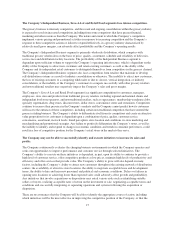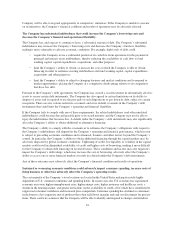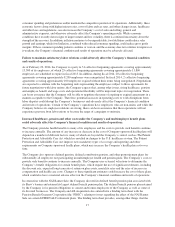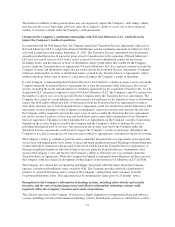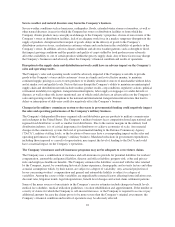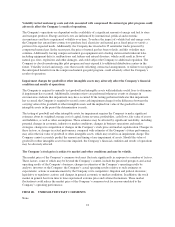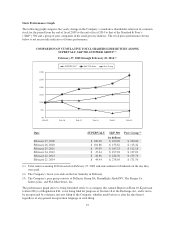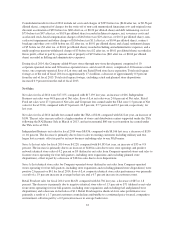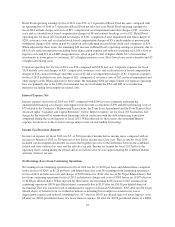Albertsons 2014 Annual Report Download - page 27
Download and view the complete annual report
Please find page 27 of the 2014 Albertsons annual report below. You can navigate through the pages in the report by either clicking on the pages listed below, or by using the keyword search tool below to find specific information within the annual report.case regarding the non-arbitration plaintiffs. Plaintiffs appealed these decisions. On February 12, 2013, the
Eighth Circuit reversed the District Court decision requiring plaintiffs with arbitration agreements to arbitrate and
the Company filed a Petition with the Eighth Circuit for an En Banc Rehearing. On June 7, 2013, the Eighth
Circuit denied the Petition for Rehearing and remanded the case to the District Court. On October 30, 2013, the
parties attended a District Court ordered mandatory mediation which was not successful in resolving the matter.
On November 21, 2013, the Eighth Circuit held a hearing on plaintiffs’ appeal from the Class Certification denial
and Summary Judgment decisions. The Eighth Circuit took the matter under advisement. On December 13, 2013,
the District Court granted the Company’s motion to stay the proceedings at the District Court, pending a decision
on the second Eighth Circuit appeal regarding class certification and summary judgment.
In May 2012, Kiefer, a former Assistant Store Manager at Save-A-Lot, filed a class action against Save-A-Lot
seeking to represent current and former Assistant Store Managers alleging violations of the Fair Labor Standards
Act related to the fluctuating work week method of pay (“FWW”) in the United States District Court in the District
of Connecticut. FWW is a method of compensation whereby employees are paid a fixed salary for all hours worked
during a week plus additional compensation at one-half the regular rate for overtime hours. Kiefer claimed that the
FWW practice is unlawful or, if lawful, that Save-A-Lot improperly applied the FWW method of pay, including in
situations involving paid time off, holiday pay, and bonus payments. In March 2013, the United States District
Court granted conditional certification in favor of Kiefer on the issue of whether Save-A-Lot properly applied the
FWW. In May 2013, the United States District Court denied Save-A-Lot’s motion for summary judgment on the
same issue. This FWW practice is permissible under the Fair Labor Standards Act and other state laws, and Save-A-
Lot denied all allegations in the case. The same plaintiffs’ attorneys representing Kiefer filed two additional FWW
actions against Save-A-Lot and SUPERVALU. Shortly before filing of the Kiefer lawsuit, in one of these cases
filed by a former Assistant Store Manager (Roach) in March 2011, the Superior Court for the Judicial District of
Hartford at Hartford granted summary judgment in favor of Save-A-Lot determining FWW was a legal practice in
Connecticut. In March 2013, another Save-A-Lot Assistant Store Manager (Pagano) filed an FWW class claim
against SUPERVALU under Pennsylvania state law in the Philadelphia County Court of Common Pleas relating to
overtime payment. In all three cases, which the Company was defending vigorously, plaintiffs were seeking
monetary damages and attorneys’ fees. On August 20, 2013, the parties agreed in principle to resolve the matters on
a nationwide basis in a settlement that will cap the Company’s aggregate obligation, including with respect to
settlement funds, plaintiffs’ attorneys fees and costs and settlement administration costs. The settlement is subject to
the applicable courts’ preliminary and final approval. The court granted preliminary approval of the settlement on
March 13, 2014. Final approval is subject to the court’s approval, which the parties expect to seek in July 2014. The
Company recorded a litigation settlement charge of $5 before tax ($3 after tax) in the second quarter of fiscal 2014
in connection with the expected settlement of this matter. The Company funded $5 into a qualified settlement fund
on February 28, 2014.
Predicting the outcomes of claims and litigation and estimating related costs and exposures involve substantial
uncertainties that could cause actual outcomes, costs and exposures to vary materially from current expectations.
The Company regularly monitors its exposure to the loss contingencies associated with these matters and may
from time to time change its predictions with respect to outcomes and its estimates with respect to related costs
and exposures. With respect to the IOS and C&S matters discussed above, the Company believes the chance of a
negative outcome is remote. It is possible, although management believes it is remote, that material differences in
actual outcomes, costs and exposures relative to current predictions and estimates, or material changes in such
predictions or estimates, could occur in the future and have a material adverse effect on the Company’s financial
condition, results of operations or cash flows.
ITEM 4. MINE SAFETY DISCLOSURES
Not applicable.
25


